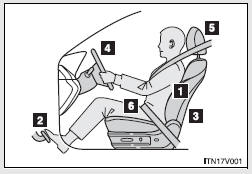Toyota Venza: Correct driving posture
Drive with a good posture as follows:

1. Sit upright and well back in the seat.
2. Adjust the position of the seat forward or backward to ensure the pedals can be reached and easily depressed to the extent required. 3. Adjust the seatback so that the controls are easily operable.
4. Adjust the tilt and telescopic positions of the steering wheel downward so the airbag is facing your chest.
5. Lock the head restraint in place with the center of the head restraint closest to the top of your ears. 6. Wear the seat belt correctly.
CAUTION
- While driving
• Do not adjust the position of the driver’s seat.
Doing so could cause the driver to lose control of the vehicle.
• Do not place a cushion between the driver or passenger and the seatback.
A cushion may prevent correct posture from being achieved, and reduce the effectiveness of the seat belt and head restraint, increasing the risk of death or serious injury to the driver or passenger.
• Do not place anything under the front seats.
Objects placed under the front seats may become jammed in the seat tracks and stop the seat from locking in place. This may lead to an accident.
The adjustment mechanism may also be damaged.
- Adjusting the seat position
• Do not recline the seat more than necessary when the vehicle is in motion, to reduce the risk of sliding under the lap belt.
If the seat is too reclined during an accident, the lap belt may slide past the hips and apply restraint forces directly to the abdomen or your neck may contact the shoulder belt, increasing the risk of death or serious injury.
• Take care when adjusting the seat position to ensure that other passengers are not injured by the moving seat.
• Do not put your hands under the seat or near the moving parts to avoid injury.
Fingers or hands may become jammed in the seat mechanism.
 SRS airbags
SRS airbags
The SRS airbags inflate when the vehicle is subjected to certain types of
severe impacts that may cause significant injury to the occupants. They work together
with the seat belts to help reduce t ...
Other materials about Toyota Venza:
Diagnostic Trouble Code Chart
DIAGNOSTIC TROUBLE CODE CHART
HINT:
If a trouble code is stored during the DTC check, inspect the trouble areas listed
for that code. For details of the code, refer to the "See page" below.
Main Body
DTC Code
Detection Ite ...
Problem Symptoms Table
PROBLEM SYMPTOMS TABLE
Use the table below to help determine the cause of problem symptoms. If multiple
suspected areas are listed, the potential causes of the symptoms are listed in order
of probability in the "Suspected Area" column of the tab ...
Open in CAN Main Bus Line
DESCRIPTION
There may be an open circuit in the CAN bus main wire and/or the DLC3 branch
wire when the resistance between terminals 6 (CANH) and 14 (CANL) of the DLC3 is
70 Ω or higher.
Symptom
Trouble Area
Resista ...
0.1415

